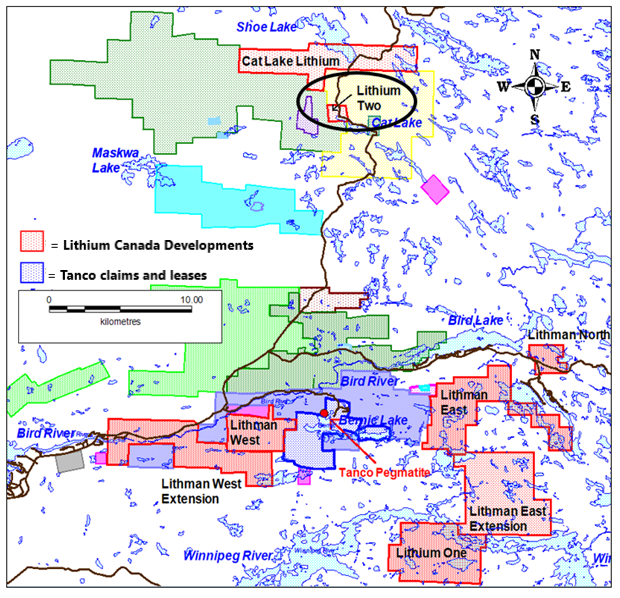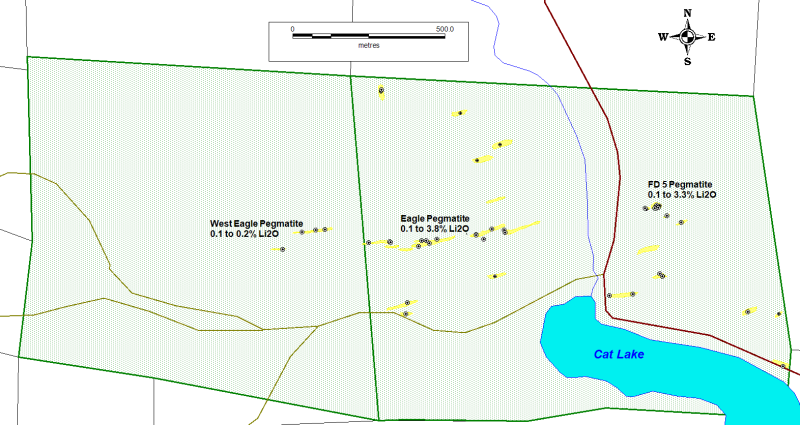Lithium Division Update: Lithium Two Drill Permit Issued
(TheNewswire)
----------------------------------------------------------------------------------------------------------------------------------------------------------------------------------------------------------------------------------------------------------------------- |-A drill permit has been issued by the Manitoba government for a drill program on the company’s Lithium Two Project. | |-NAM has100% ownership of eight pegmatite hosted Lithium and Rare Element Projects in the Winnipeg River Pegmatite Field, located in southeast (SE) Manitoba. | |-Exploration in SE Manitoba is focused on Lithium-bearing pegmatites. | |-Archaeological Assessment in progress on Lithium One as part of the drill permit process. | |-The eight projects are strategically situated within the Winnipeg River Pegmatite Field, which hosts the world-class Tanco Pegmatite that has been mined for Tantalum, Cesium and Spodumene (one of the primary Lithium minerals) in varying capacities, since 1969.| |-NAM management is finalizing a plan for a 1,500-metre drill program on Lithium Two. | |-The company has signed an Exploration Agreement with the Sagkeeng First Nation (see Oct 25th, 2018 News Release). | | | -----------------------------------------------------------------------------------------------------------------------------------------------------------------------------------------------------------------------------------------------------------------------October 30th, 2019 – TheNewswire - Rockport, Canada – New Age Metals Inc. (NAM) (TSX.V: NAM; OTCQB: NMTLF; FSE: P7J) New Age Metals is pleased to announce that a drill permit has been issued to the company’s wholly owned subsidiary, Lithium Canada Development by the Manitoba government for the company’s Lithium Two Project located in the Cat Lake area of southeast (SE) Manitoba.
The Winnipeg River Pegmatite Field
The Winnipeg River-Cat Lake Pegmatite Field in SE Manitoba is host to numerous pegmatite deposits and contains the world-class Tanco Pegmatite. The Tanco pegmatite has been mined since 1969 in varying capacities for spodumene (Li rich mineral), Tantalum and Cesium. The pegmatite field contains at least 10 pegmatite groups and hosts hundreds of pegmatite bodies. Many of the pegmatites are lithium bearing.
The Tanco Mine, which was owned by the Cabot Corporation, was recently sold to Sinomine Rare Metals Resources Co. Ltd. (Sinomine) at a purchase price of $130 million ($US). Sinomine is a joint stock public company based in China, principally engaged in the provision of geological exploration, mining investment and base metal chemical manufacturing. This transaction certainly adds new interest in the region as to the potential of the pegmatite field and lithium and/or rare element potential in the area. This sale should advance the Lithium production potential of the area as Lithium Ore feed may be required in the event that Sinomine commences lithium production.
Lithium Two Project
The Lithium Two Project is located approximately 20 kilometres north of the Tanco Mine and is an active area for Lithium exploration. Several companies are active in the immediate region, exploring for Lithium.
Surface exploration was carried out on the Lithium Two Project during the summer of 2018 (see News Release October 30th, 2018). The exploration work was designed to examine the known surface pegmatites to aid in the determination of drill targets. The field program also focussed on more detailed structural geological mapping and mapping of the westward extent of the Eagle Pegmatite. The Lithium Two Project has several historically known Spodumene bearing pegmatites (see Figure 2).
Figure 1: Manitoba Lithium and Rare Element Projects 2019
The Eagle Pegmatite was drilled in 1947 with a historic (non 43-101 compliant) tonnage estimate of 544,460 tonnes with a grade of 1.4% Li2O to the 61-metre level. These historical estimates do not use categories that conform to current CIM Definition Standards on Mineral Resources and Mineral Reserves as outlined in National Instrument 43-101, Standards of Disclosure for Mineral Projects (“NI 43-101“) and have not been redefined to conform to current CIM Definition Standards. A qualified person has not done sufficient work to classify the historical estimates as current mineral resources and the Company is not treating the historical estimates as current mineral resources. Investors are cautioned that the historical estimates do not mean or imply that economic deposits exist on the properties. The Company has not undertaken any independent investigation of the historical estimates or other information contained in this press release nor has it independently analyzed the results of the previous exploration work in order to verify the accuracy of the information. The Company believes that these historical estimates and other information contained in this news release are relevant to continuing exploration on the properties as it identifies significant mineralization that will be the target of future exploration and development.
The Eagle Pegmatite was historically reported to remain open to depth. The FD5 Pegmatite, located east of the Eagle Pegmatite has never been drilled. Historic assessment reports revealed a Spodumene bearing pegmatite drilled in the late 1940’s, located approximately 500 metres southeast of the Eagle Pegmatite but is not exposed on surface. No assays were provided in the report at the time. This pegmatite, as well as the Eagle and FD5, will be tested during an upcoming recommended drill program.
Figure 2: 2018 Lithium Assays at the Lithium Two Project, SE Manitoba
The Eagle Pegmatite has been mapped on surface for over 850 metres and has surface assays of 0.1 to 3.8% Li2O. The FD5 pegmatite had surface assays from 0.1 to 3.3% Li2O. In geological terms, the pegmatites encountered on the Lithium Two Project are LCT Type (Lithium-Cesium-Tantalum) Pegmatites and are in the Albite-Spodumene Subgroup. Spodumene is expressed in the pegmatites as small green blades up to 3 centimetres in length. The Eagle Pegmatite is a west-northwest to west-striking, vertically dipping, lenticular pegmatite dyke intruded into mafic volcanics. The widths of the pegmatite have been measured to be between 2 to 10 metres. The Eagle Pegmatite system appears to be a swarm of closely spaced pegmatite bodies.
Phase 1 Drill Program Planning in Progress
A drill program of 1,500 metres is planned to test three spodumene bearing pegmatite targets. A drill permit has recently been issued by the Manitoba government.
Lithium One Drill Program
Recently, NAM engaged White Spruce Archaeology as part of its Exploration Agreement with the Sagkeeng First Nation to conduct an archaeological assessment on the proposed drill sites for Lithium One as part of the drill permitting process. The assessment was completed in October and the report is pending. A 1,500 metre drill program is planned to test targets on the Silverleaf pegmatite ( News Release Sept 27, 1018) situated in the Lithium One project area.
NAM/AAZ Property Option Update
JV partner Azincourt Energy (AAZ) and NAM are in discussions regarding AAZ's compliance for its contractual obligations as part of the option agreement with NAM. NAM and AAZ are in continuing talks regarding a revision to the existing option agreement or termination.
OPT-IN LIST
If you have not done so already, we encourage you to sign up on our website (www.newagemetals.com) to receive our updated news.
ABOUT NAM’S PGM DIVISION
NAM’s flagship project is its 100% owned River Valley PGM Project (NAM Website – River Valley Project) in the Sudbury Mining District of Northern Ontario (100 km east of Sudbury, Ontario). Recently the company announced the results of the first PEA (see News Release – June 27th, 2019) completed on the River Valley Project. The PEA has been developed by various independent consultants – P&E Mining Consultants Inc. (P&E) was responsible for the open pit mining, surface infrastructure, tailings facility, and project economics; DRA Americas Inc. ("DRA") was responsible for all metallurgical test work and processing aspects of the Project; and WSP Canada Inc. ("WSP") was responsible for the Mineral Resource Estimate. The PEA is a preliminary report but it has demonstrated that there are positive economics for a large-scale mining open pit operation, with 14 years of Palladium and Platinum production.
The Genesis project is a PGM-Cu-Ni property located in the northeastern Chugach Mountains, 75 paved road miles north of the all-season port city of Valdez, Alaska. The project is within 3 km of the all-season paved Richardson Highway and a high capacity electric power line. The project is covered by 4,144 hectares of State of Alaska mining claims owned 100% by New Age Metals. Past exploration has revealed the presence of chromite-associated platinum and palladium mineralization and stratabound Ni-Cu-PGM mineralization within magmatic layers of the Tonsina Ultramafic Complex. Pyrrhotite, pentlandite, and chalcopyrite occur in disseminations and net textured segregations associated with platinum and palladium sulfides. There has been limited exploration over the Genesis project and there has been no past exploration drilling on the project. NAM management is actively seeking an option/joint-venture partner for this road accessible PGM and Multiple Element Project.
QUALIFIED PERSON
The contents contained herein that relate to exploration results or geological aspects is based on information compiled, reviewed or prepared by Carey Galeschuk, P. Geo., a consulting geoscientist for New Age Metals. Mr. Galeschuk is the Qualified Person as defined by National Instrument 43-101 and has reviewed and approved the technical content of this news release.
On behalf of the Board of Directors
“Harry Barr”
Harry G. Barr
Chairman and CEO
Neither the TSX Venture Exchange nor its Regulation Services Provider (as that term is defined in the policies of the TSX Venture Exchange) accepts responsibility for the adequacy or accuracy of this release.
Cautionary Note Regarding Forward Looking Statements: This release contains forward-looking statements that involve risks and uncertainties. These statements may differ materially from actual future events or results and are based on current expectations or beliefs. For this purpose, statements of historical fact may be deemed to be forward-looking statements. In addition, forward-looking statements include statements in which the Company uses words such as “continue”, “efforts”, “expect”, “believe”, “anticipate”, “confident”, “intend”, “strategy”, “plan”, “will”, “estimate”, “project”, “goal”, “target”, “prospects”, “optimistic” or similar expressions. These statements by their nature involve risks and uncertainties, and actual results may differ materially depending on a variety of important factors, including, among others, the Company’s ability and continuation of efforts to timely and completely make available adequate current public information, additional or different regulatory and legal requirements and restrictions that may be imposed, and other factors as may be discussed in the documents filed by the Company on SEDAR (www.sedar.com), including the most recent reports that identify important risk factors that could cause actual results to differ from those contained in the forward-looking statements. The Company does not undertake any obligation to review or confirm analysts’ expectations or estimates or to release publicly any revisions to any forward-looking statements to reflect events or circumstances after the date hereof or to reflect the occurrence of unanticipated events. Investors should not place undue reliance on forward-looking statements.
Copyright (c) 2019 TheNewswire - All rights reserved.

